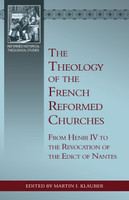
Klauber, Martin I. (ed.)
The Theology of the French Reformed Churches: From Henry IV to the Revocation of the Edict of Nantes (Klauber)
Description
The Theology of the French Reformed Churches introduces us to the Huguenots of the seventeenth century. The period was an unusual one in which France boasted two state religions, Roman Catholic and Protestant, due to the protections afforded the latter by the Edict of Nantes in 1598. In this book, Martin I. Klauber and his team of scholars survey the development of and diffi culties facing the early French Reformed tradition as well as the ecclesiastical, theological, and political challenges it faced during the seventeenth century.
They also investigate the important contributions made by some of its most significant theologians: Moïse Amyraut, Pierre du Moulin, Jean Daillé, Andreas Rivetus, Charles Drelincourt, Claude Pajon, Jean Claude, and Pierre Jurieu. The theologians of the seventeenth-century French Reformed churches displayed a theological richness rarely remembered even among Reformed believers in the centuries following their labor, and this volume resurrects some of their vitality for a new audience.
Contents
Introduction — Martin I. Klauber
Part One: The Historical Background
1. The Cradle of Reformed Theology: The Reformed Churches from Calvin’s Geneva through Henry IV & the Edict of Nantes —Jeanine Olson
2. Theodore Beza (1519–1605) and the Crisis of Reformed Protestantism in France —Scott M. Manetsch
3. The French Reformed Synods of the Seventeenth Century —Theodore G. Van Raalte
4. The French Reformed Churches, Arminianism, and the Synod of Dort (1618–1619) —Donald Sinnema
5. The French Reformed Churches: Caught between the Rise of Absolute Monarchy and the Counter Reformation —John B. Roney
6. The Edict of Nantes “à la rigueur” (1661–1685) —Marianne Carbonnier-Burkard
Part Two: Theology and Theologians in the French Reformed Churches
7. John Cameron (ca. 1579–1625) and the French Universalist Tradition — Albert Gootjes
8. Beyond Hypothetical Universalism: Moïse Amyraut (1596–1664) on Faith, Reason, and Ethics —Richard A. Muller
9. Defender of the Faith or Reformed Rabelias? Pierre du Moulin (1568–1658) and the Arminians —Martin I. Klauber
10. Whose Side are They on? Jean Daillé (1594–1670) on the Church Fathers — Martin I. Klauber
11. Andreas Rivetus (1572–1651): International Theologian and Diplomat — Willem J. van Asselt
12. The Pastoral and Polemical Theology of Charles Drelincourt (1595–1669) — R. Jane McKee
13. Polemics, Rhetoric, and Exegesis: Claude Pajon (1626–1685) on Romans 8:7 — Albert Gootjes
14. “This glorious seal of God”: Jean Claude (1619–1687), Ephesians 4:30, and Huguenot Pneumatology —Michael A. G. Haykin
15. The Devotional Theology of Pierre Jurieu (1637–1713) —Jason Zuidema
Endorsements
“Aside from the Wars of Religion and the Revocation of the Edict of Nantes, French Protestantism is largely ignored in most discussions of early modern history. This important book will help fill that void. The collected essays by many leading scholars highlight the theological contributions and historical travails of the seventeenth-century Huguenots, allowing them to resume their rightful place in a pivotal century in European history.”
—Glenn S. Sunshine, professor of history, Central Connecticut State University
“This most welcome collection of essays, authored by an impressive team of leading scholars, goes to the heart of the Huguenot experience during the increasingly troubled seventeenth century. The initial chapters set the context with lucidity and precision. Subsequent contributions offer a superb exploration of the thought and influence of eight celebrated French Reformed theologians. Professor Klauber and his colleagues have provided an encompassing, informative, and absorbing assessment of Reformed theological positions and their elaboration during a critical era in the history of French Protestantism.”
—Raymond A. Mentzer, Daniel J. Krumm Family Chair in Reformation Studies, University of Iowa
About the Author
Martin I. Klauber is an Affiliate Professor of Church History at Trinity Evangelical Divinity School.